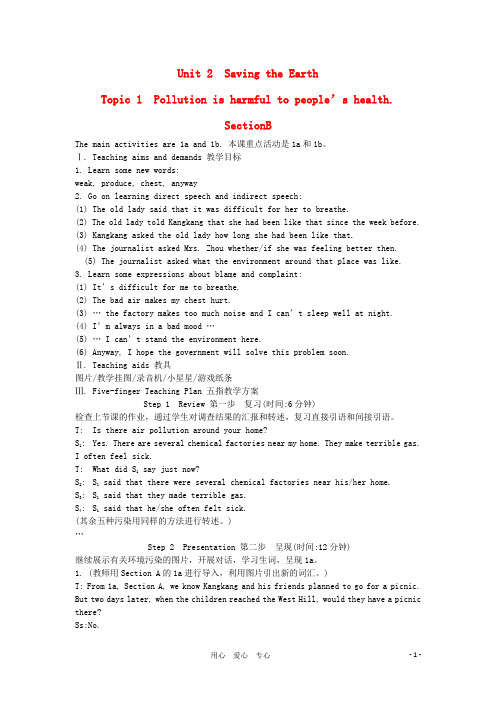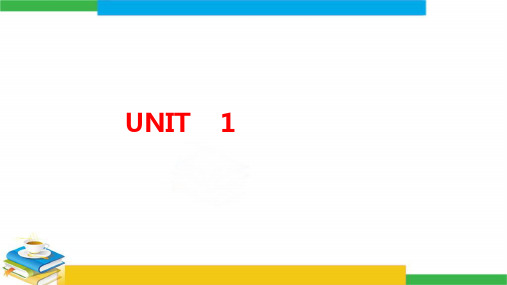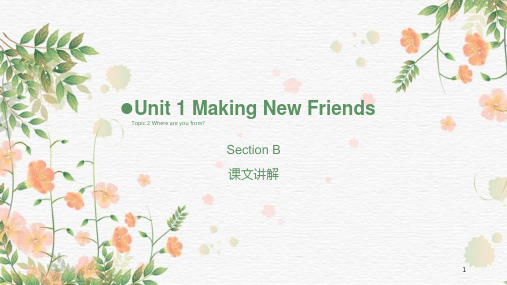第二讲 unit 1B
人教版九年级下册英语Unit1 SectionB(2a-2e)课件

• Share the learning habit you like best.
Post-reading
2d Look up the following words from the passage
认真完成作业
by
finding a pen pal taking part in English classes
找个笔友 上英语课
keeping a dairy in English
用英语写日记
reading English magazines
读英语杂志
getting an English tutor(家教)
熟能生巧。
Yes, I agree. 4. Do good learners learn from mistakes, or are they afraid of making mistakes? They learn from mistakes.
5. What study skills does the writer talk about? Do you have those study skills? 学习技能 Taking notes by writing down key words or by drawing mind maps, looking for ways to review what they have learned, and doing this by reading their notes every day or by explaining the information to another student.
九年级英语上册《Unit 2 Saving the Earth》Topic1 SectionB 教案 仁爱版

Unit 2 Saving the EarthTopic 1 Pollution is harmful to people’s health.SectionBThe main activities are 1a and 1b. 本课重点活动是1a和1b。
Ⅰ. Teaching aims and demands 教学目标1. Learn some new words:weak, produce, chest, anyway2. Go on learning direct speech and indirect speech:(1) The old lady said that it was difficult for her to breathe.(2) The old lady told Kangkang that she had been like that since the week before.(3) Kangkang asked the old lady how long she had been like that.(4) The journalist asked Mrs. Zhou whether/if she was feeling better then.(5) The journalist asked what the environment around that place was like.3. Learn some expressions about blame and complaint:(1) It’s difficult for me to breathe.(2) The bad air makes my chest hurt.(3) … the factory makes too much noise and I can’t sleep well at night.(4) I’m always in a bad mood …(5) … I can’t stand the environment here.(6) Anyway, I hope the government will solve this problem soon.Ⅱ. Teaching aids 教具图片/教学挂图/录音机/小星星/游戏纸条Ⅲ. Five-finger Teaching Plan 五指教学方案Step 1 Review 第一步复习(时间:6分钟)检查上节课的作业,通过学生对调查结果的汇报和转述,复习直接引语和间接引语。
2019-2020学年新外研版高中英语课堂总结课件:必修2 UNIT 1 Section B

词汇五 investigate v. 查明,调查 【教材原句】 Investigate questions like these at our club. 在我们俱乐部研究这样的问题。 【要点必记】 investigate sb.(for sth.)(因为某事)调查某人
单句语法填空
(增加体重)quickglya.in
from
gain weight
词汇九 apply v. 请求,申请;使用,应用;有关,涉及 【教材原句】
After-school activities also play a part when students apply to college. 学生申请大学时,课外活动也起到一定的作用。 【要点必记】 (1)apply(to sb.)for sth.(向某人)申请某物
一句多译 这个学校为学生提供各种各样的课程。 (4) Students are offered __v_a_r_io_u_s____/ ____a_____ __v_a_r_ie_t_y__ ____o_f____ /__v_a_r_i_et_i_es_ ____o_f____ courses in this school.
mathematical problem.
(3) They are __h_i_g_h_l_y__ _in_t_e_ll_i_g_e_n_t _s_t_u_d_e_n_ts__(非常聪明的学生). (4) Susan’s a woman ____o_f____ ___h_ig_h____in__te_l_li_g_e_n_c_e(具有高智商的)we
(3)[词汇复现]Scientists _____________________________________________
仁爱版九年级英语上册Unit2Topic1SectionB教案

仁爱版九年级英语上册Unit2Topic1SectionB教案Unit 2 Saving the EarthTopic 1 Section B教案教学目标1.知识与能力目标Words and phrases: pain, produce, awful, bear, harmful, chest, editor, breathe/breath, soil get a pain in…, what’s worse, too much noise, too many problems, breathing problem, be harmful to, make a mess of, throw…aroundSentences: It’s difficult for me to breathe./ I’ve got a pain in my throat./ It’s really awful.A: How long have you been like this? A: Have you seen a doctor?B: I’ve been like this since la st week. B: Not yet.Grammar: Present Perfect (past participle和疑问句的问答).2.过程与方法通过谈论环境问题,让学生了解不同种类的污染及其危害。
3.情感态度与价值观引导学生关注环境问题,树立绿色环保意识,增强忧患意识和社会责任感。
教学重点1. some new words and useful phrases; the present perfect tense2. the present perfect tense教学过程Step 1 Review1. go over the phrases in section A2. Guide the Ss to discuss different kinds of pollution ingroups and share the answer together. Step 2 Presentation1. Watch the flash, then answer the questions below.1) Does Bruce look well?2) What’s wrong with him?3) How long has he been like this?4) Has he seen a doctor?2. Show a picture of the polluted West Hill, let the Ss listen to 1a once and tick the questions they hear in part A of 1b. Then check the answers together.A. Listen to 1a and check the questions you hear.1) What’s wrong with you?2) How long have you been like this?3) Where have you been?4) Have you seen a doctor?5) Have you noticed the dead fish in the river?B. Listen again and match each question above with an answer below.3. Read 1a and answer the questions.1) What caused Mrs. Zhou’s problems?2) What will Kangkang do?Step 3 Consolidation1.分角色朗读2a,选择四组进行比赛,激发学生朗读兴趣。
Unit 1 Topic 2 Section B课文讲解课件仁爱版英语七年级上册

Deng Yaping
知识拓展
Stephen Hawking
family name
given name
姓
名
邓亚萍
given name
family name
名
姓
史蒂芬·霍金
15
Bye-bye
16
Unit 1 Making New Friends
Topic 2 Where are you from?
Section B 课文讲解
1
2
原文呈现
3
• look v. 看;看起来
重点精讲
Look! Who is she?
意为 “看”
Look! This is a cat.
意为 “看起来” You look happy.
Where is she from?
12
练一练
A: Look! _W__h_o_i_s_s_h_e__? B: She is Deng Yaping. A: Where is she from? B: __S_h_e_i_s_f_r_o_m__C_h_i_n_a____.
13
练一练
A: Look at the picture. Is he Stephen __. A: _W__h_e_r_e_i_s_h_e_f_r_o_m___? B: He is from England.
后接形容词
4
重点精讲
Look! Who is she?
注意
look用作不及物动词,后接宾 语,表示“看……”时要使用
look at。
e.g. 看这个女孩。
Look at this girl.
5
重点精讲
Unit 1 Section B(1a-1d)课件人教版2024新教材七年级上册英语

play tennis big family
She is 14 years old. She is from Singapore. She has a pet bird. I like to play tennis.
1d Compare yourself with either Pauline or Peter.
1. What can you see in the pictures?
A guitar, the big ben in the UK and Beijing roast duck.
2. Where are pictures?
They are on a board.
3. What are the pictures used for?
each other 彼此
Prediction(预测) Look at the picture and answer these questions.
1. What can you see in the pictures?
A parrot, Merlion in Singpore and a badmiton.
Review
按要求写出正确的单词、词组或句子。
1. 在同一个班级 (短语)in__t_h_e_s_a_me class 2. 班主任 (短语) _c_l_a_ss__te_acher
九年级英语全册 --Unit 1 Section B 第二课时

succeeded by trying many times and learning from his mistakes.
Developing their study skills It is not enough to just study hard. Good learners know the best way they can study. For example, they may take notes by writing down key words or by drawing mind maps. They also look for ways to review what they have learned. They may do this by reading their notes every day or by explaining the information to another student.
Everyone is born with the ability to learn. But whether or not you can do this well depends on your learning habits. Research shows that successful learners have some good habits in common.
2c Read the passage again and answer the questions.
1. Does the writer think that everyone is born with the ability to learn well? Do you agree? Why or why not?
人教版八年级英语上册教学课件:Unit1 B (2a-2e)

12
2c Read Jane’s diary entries again. Fill in the chart.
20
2. try v.& n. 尝试;设法;努力 I’ll try to improve. (用作动词) 我要设法改进。 Come
21
try to do sth. & try doing sth.
两者含义不同 前者:“试图或努力去做某事”, 后者:“尝试/试验一下某种方法”。 e.g. try to climb the mountain
17
2e Imagine Jane went to Penang Hill again and had a great day. Fill in the blanks in her diary entry with the correct forms of the verbs in brackets.
My _fa_t_h_e_r_ and I went to Penang Hill, but the weather __w_a_s__ really bad and rainy. We _w__a_it_e_d_ a long time for the train and we were __w__e_t__ and cold because we forgot to bring an _u_m_b__re_l_la_. Anna: Oh, no! Jane: And that’s not all! We also didn’t bring _e_n_o_u_g_h_ money, so we only had one bowl of rice and some fish.
- 1、下载文档前请自行甄别文档内容的完整性,平台不提供额外的编辑、内容补充、找答案等附加服务。
- 2、"仅部分预览"的文档,不可在线预览部分如存在完整性等问题,可反馈申请退款(可完整预览的文档不适用该条件!)。
- 3、如文档侵犯您的权益,请联系客服反馈,我们会尽快为您处理(人工客服工作时间:9:00-18:30)。
第一讲How can we become good learners?Section B【重点单词】1. pronounce [prəˈnauns] v. 发音2. increase [inˈkri:s] v. 增加;增长3. speed [spi:d] n. 速度4. partner [ˈpɑ:tnə] n.搭档;同伴5. born [bɔ:n] v. 出生; adj. 天生的be born with 天生具有6. ability [əˈbiliti] n. 能力,才能7. create [kriˈeit] v. 创造,创建8. brain [brein] n. 大脑9. active [ˈæktiv] adj. 积极的;活跃的10. attention [əˈtenʃən] n. 注意;关注pay attention to 注意;关注11. connect [kəˈnekt] v. (使)连接;与…有联系connect...with 把......和......连接或联系起来12. overnight [ˌəuvəˈnait] adv. 一夜之间;在夜间13. review [riˈvju:] v.& n. 回顾;复习14. knowledge [ˈnɔlidʒ] n. 知识;学问15. lifelong ['laiflɔŋ] adj. 终身的;毕生的16. wisely [waizli] adv. 明智地;聪明地Annie [ˈæni] 安妮(女名)Alexander 亚历山大.格雷厄姆.贝尔【重点短语】1.not always 不一定总是2.increase to... 增加到......3.increase by... 增加了......4.speed of... 以......的速度5.make mistakes=make a mistake 犯错,出错6.get...right 使......正确,纠正7.be born with 天生俱有8.depend on 视......而定,依靠,依赖9.be interested in=take an interest in 对......感兴趣10.take an active part in 积极参加......11.pay attention to 注意,关注12.connect... with... 把...和...连接或联系在一起13.be connected with 与......有关系14.get bored 感到厌烦,无聊15.think about 考虑16.think over 仔细考虑17.think of 想起18.be good at=do well in 在......方面擅长/做得好19.be good for 对......有益20.be good to 对......和蔼/友善21.even if=even though 即使22.keep doing sth. 一直做某事23.keep sb.doing sth. 让某人一直做某事24.be afraid of 害怕......25.on one’s own 独自,单独,独立地26.of one’s own 属于某人自己的27.with one’s own 用某人自己的28.instead of 代替,而不是【重点句型】1.I can't always understand spoken English. 我并非总是能听懂英语口语。
2.I don’t know how to increase my reading speed. 我不知道如何提高我的阅读速度。
3.I often make mistakes in grammar. 我经常在语法方面犯错误。
4.He can’t get the pronunciation right. 他不能使发音正确。
5.I don’t have a partner to practice English with. 我没有一起练习英语的伙伴。
6.Everyone is born with the ability to learn. 每个人天生都具有学习的能力。
7.But whether or not you can do this well depends on your learning habits.但是你是否能把这做好取决于你的学习习惯。
8.Creating an interest in what they learn. 激发他们对所学内容的兴趣。
9.Studies show that if you are interested in something, your brain is more active and it is also easier for you to pay attention to it for a long time.研究表明,如果你对某事感兴趣,你的大脑就会变得活跃,你也更容易长时间关注它。
10.Good learners often connect what they need to learn with something interesting.好的学习者常常将他们需要学习的东西与之感兴趣的东西联系起来。
11.This way they will not get bored. 这样他们就不会感到无聊。
12.Good learners think about what they are good at and what they need to practice more.好的学习者会思考他们擅长什么和需要多练习什么。
13.Even if learn something well, you will forget it unless you use it.即使有些东西你学得很好,除非你使用它,否则也会遗忘。
14.Good learners will keep practicing what they have learned,and they are not afraid of making mistakes.好的学习者会继续练习他们已经学到的,而且他们不害怕犯错误。
15.They also look for ways to review what they have learned.他们也寻找一些方法来复习他们已学过的知识。
16.Knowledge comes from questioning. 知识来源于质疑。
17.Everything that you learn becomes a part of you and changes you, so learn wisely and learn well.你学到的一切都会成为你的一部分,并且改变着你,所以要智慧地学,还要好好地学。
18.Remember to take notes in class and review them on your own or with friends after class.记得要在课堂上记笔记,课后自己或者与朋友一起复习它们。
19.Try to study and remember information bit instead of waiting until the last minute to study everything at once. 要努力学习并一点点地记住信息,而不是直到最后一分钟才马上学习一切。
【重点语法】1.not always是部分否定的用法,不一定总是,未必总是,不总是。
当not与both,always,all ,everyone,everything等词连用时,表示部分否定。
Eg:Those who have a lot of money are not always happy.2.how to increase my reading speed是“疑问词+动词不定式”结构,在句中作know的宾语。
英语中,疑问代词what,who,which和疑问副词where,when,why,how等后面可接动词不定式,这种结构在句中可作主语,宾语,表语等成分。
此结构作宾语时,常与动词know,tell,wonder,ask,show,teach,learn,decide等连用。
Eg:we don’t know when to have the meeting.3.increase to 增加到...... Eg:The population in this city will increase to1000000.Increase of增加了...... Eg:The price of the vegetables increased by 10%.4.speed of... 以......的速度Eg:Did you make a mistake again?5.Get ...right... 使......正确,纠正......,“get+宾语+宾语补足语”结构通常表示“使某人/某事物处于某种状态或位置”。
Eg:The work gets everyone tired.6.Be born with 天生具有Eg:She was born with a gift for music.Be born 出生,出世,为被动语态Eg:He was born in Beijing on October 9th,1998born用于形容词,天生的Eg:He is a boen poet.7.whether or not是英语从句中的一个练此结构,意思和功能均相当于whether,意为“是否”,常出现在宾语从句,主语从句中Eg;I don’t know whether or not to believe him.8.depend on 视......而定;依靠;依赖。
其后可接名词,代词,动词-ing形式或从句。
既不能用于进行时态,也不能用于被动语态。
Eg:The price depends on the quality.9.interested 有兴趣的,感兴趣的,常作表语,主语一般是人interesting 令人感兴趣的,有趣的,既可作表语又可作定语,常用来说明事物。
Eg:The students in Class Two are interested in this interesting story.10.need作情态动词时,无人称和数的变化,后面跟动词原形。
Eg:You needn’t worry about her.回答must引导的一般疑问句时,肯定回答用must,否定回答用needn’t或don’t have to.Eg:---Must I clean the floor now?---Yes,you must.---No,you needn’t/don’t have to11.bord形容词,厌倦的,厌烦的,作表语时句子主语通常是人Eg:Some bored with her job.boring形容词,令人厌烦的,可作表语,也可作定语,作表语时主语通常是物。
